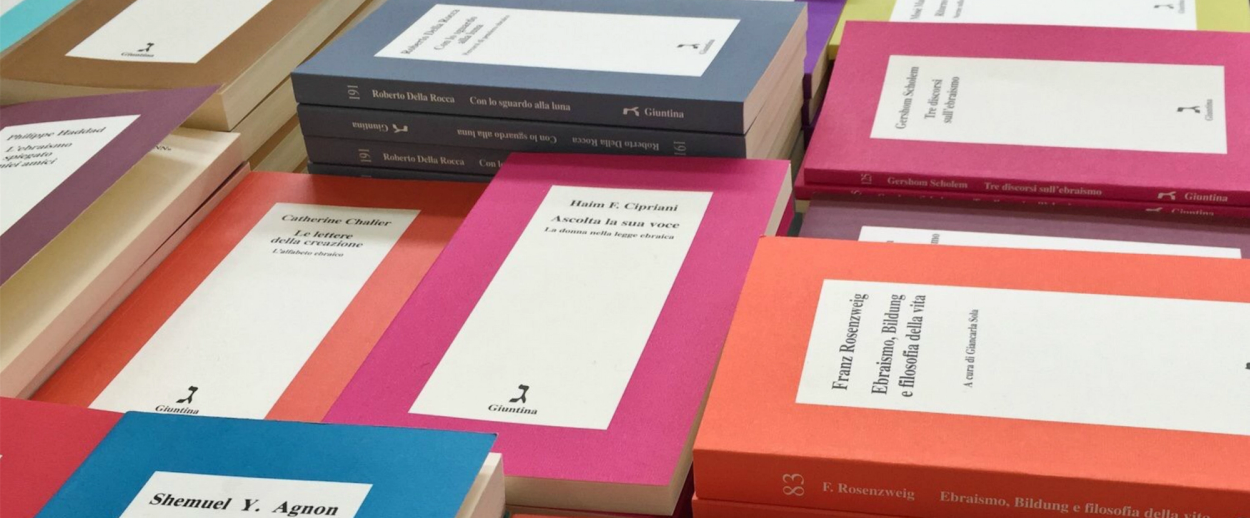The Inspiring History of Europe’s Largest Jewish Publishing House
From the Talmud to contemporary Israeli fiction, Giuntina brings Jewish literature to Italy




Whether you’re looking for the latest Israeli best-selling novel, the five books of the Torah, or even the translation of the Babylonian Talmud, in Italy, there is one man behind all of these books. He’s called Shulim Vogelmann, and he’s the director of Giuntina, which he claims is the most active Jewish-themed publishing house in Europe.
Vogelmann is currently in New York, where he’s spent the last few months with his wife and two daughters; on May 9, he will speak at an event organized by the Primo Levi Center in New York on the fascinating history of his publishing house.
“In 2012, I read a review published by Tablet of Jamie Attenberg’s The Middlesteins. I got interested in her, and I ended up publishing three of her books in Italian,” he said in an interview. Later this month, he’s releasing the translation of her latest novel, All Grown Up. (Full disclosure: He happens to have published also the Italian edition of this writer’s novel, Wide-Angle).
The history of Giuntina begins with Volgemann’s grandfather, Schulim, a Jew born in 1903 in Przemyslany, a Galician town in the Austro-Hungarian Empire. At age 16, he moved from Vienna to Palestine, where he enlisted in the British army; a few years later, he joined his brother Mordechai, who was a rabbi, in Florence, where he began working in typography.
Schulim soon became the director of his publishing house, which, incidentally, printed the first edition of Lady Chatterley’s Lover in 1928. He got married to Annetta Disegni, daughter of the chief rabbi of Turin; but during World War II, the family was deported to Auschwitz as they were attempting to escape to Switzerland, and both his wife and their eight-year-old daughter were killed. Because of his skills as a typographer, the Nazis sent Schulim to the camps of Sachsenhausen and Płaszów to print counterfeit pounds. He was the only Italian on Oskar Schindler’s famous list, and he survived.
Back in Italy, after the war, the typographer tried to build a new life and got married again. His son Daniel, born in 1948, was the one to establish the publishing house, when he casually found a French edition of Elie Wiesel’s Night in the center of Florence. He read it, understood the importance of the book, and decided to print it in 1980, transforming the understanding of the Shoah in Italy. With that first book, the publishing hosue, Giuntina, made history. But it was not until Daniel’s son Shulim Vogelmann, born in 1978, took over, that the publishing house became so active.
In a strikingly similar pattern to his grandfather’s, Vogelmann returned to Italy after spending a few years in Israel, where he had pursued a degree in history at Hebrew University. There, he’d become fluent in Hebrew and begun reading Israeli fiction.
“I realized there were many [Hebrew] books of great value that had never been translated into Italian,” he said. The triad of the most famous Israeli authors—Abraham Yehoshua, David Grossman, and Amos Oz—was already well-known in Italy, but he knew there were many titles from other authors worth translating.
So he translated novels by Nathan Shaham, Sami Michael, and others, and founded Giuntina’s successful series of Israeli fiction. It’s thanks to him that the Italian public has discovered Ayelet Gundar-Goshen, whose brilliant Waking Lions made it into The New York Times’ list of 100 Notable Books last year, as well as Assaf Gavron, Yoram Kaniuk, and many more.
Ever since, Shulim Vogelmann has taken over the publishing house; his father Daniel, who has put together the core catalogue of classics, is still working with him, but the typography shop, in the meantime, closed down. As of today, Giuntina has published about 700 books, including novels, essays (from Adin Steinsaltz to Hannah Arendt and Jonathan Sacks), children’s books, the Torah, and now, for the first time, the translation of the Babylonian Talmud into Italian.
“It’s a work of gigantic proportions,” said Vogelmann. “But I really wanted to be the one publishing it.”
The Italian government is sponsoring the translation project. The National Research Council developed a software through which translators and editors can submit and review their work. There are about 70 people currently working on it under the direction of Clelia Piperno.
Giuntina has already published the first two volumes, the tractates of Rosh Hashana and Berachot, selling more than ten thousand copies of the first one. “Many Jews in Italy had never studied the Talmud before we published the first volume,” said Vogelmann, who assigned the design of the covers of the entire body of work to Ada Rothenberg, his most trusted cover designer. “I think people were curious, as the Talmud is present in the collective imaginary.”
It may come as a surprise that the most active publisher of Jewish-themed books in Europe is located in Italy, a country with a relatively small Jewish community, if compared to the ones in France and Britain. But the greatest surprise has to do with Giuntina’s readership.
“I believe 85 percent of our readers are not Jewish,” said Vogelmann. “We operate in the national publishing market; we publish books that anyone, from any place and background, can read and feel enriched by.”
So much has changed since Daniel Vogelmann discovered Elie Wiesel’s Night and decided to print it in his father’s shop; but but the legacy of Schulim remains intact as his grandson, now at age 38, proudly continues to spread—with passion and attention to detail—some of the finest works of Jewish literature and thought.
Simone Somekh is a New York-based author and journalist. He’s lived and worked in Italy, Israel, and the United States.